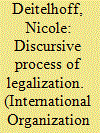|
|
|
Sort Order |
|
|
|
Items / Page
|
|
|
|
|
|
|
| Srl | Item |
| 1 |
ID:
117857


|
|
|
|
|
| Publication |
2012.
|
| Summary/Abstract |
The role of small states has been largely neglected in research on the process and outcome of multilateral negotiations. Even though these states may be active in the agenda-setting processes or display a specific engagement in certain thematic aspects of negotiations, in the end game the outcome of negotiations has been perceived to be dependent on the bargaining between major powers. However, small states also have strategies at their disposal to compensate for these weaknesses. Two principal ones come to mind, prioritization or niche diplomacy, and coalition-building to join forces with like-minded states in order to draw on their resources, expertise and manpower. In the article, we compare two cases of small state coalitions in multilateral negotiations, namely the Like Minded (LM) group in the negotiations that led to the establishment of the International Criminal Court (ICC), and the Alliance of Small Island States (AOSIS) in United Nations climate negotiations. While the two coalitions resort to similar strategies, they have not been comparably successful. We will show that the ability to translate discursive power into measurable effects on outcomes ultimately depends on the institutional setting of the negotiations and the nature of the issue that coalitions are tackling.
|
|
|
|
|
|
|
|
|
|
|
|
|
|
|
|
| 2 |
ID:
078781


|
|
|
|
|
| Publication |
2007.
|
| Summary/Abstract |
The political debate about the role of business in armed conflicts has increasingly raised expectations as to governance contributions by private corporations in the fields of conflict prevention, peace-keeping and post-conflict peace-building. This political agenda seems far ahead of the research agenda, in which the negative image of business in conflicts, seen as fuelling, prolonging and taking commercial advantage of violent conflicts, still prevails. So far the scientific community has been reluctant to extend the scope of research on `corporate social responsibility' to the area of security in general and to intra-state armed conflicts in particular. As a consequence, there is no basis from which systematic knowledge can be generated about the conditions and the extent to which private corporations can fulfil the role expected of them in the political discourse. The research on positive contributions of private corporations to security amounts to unconnected in-depth case studies of specific corporations in specific conflict settings. Given this state of research, we develop a framework for a comparative research agenda to address the question: Under which circumstances and to what extent can private corporations be expected to contribute to public security?
|
|
|
|
|
|
|
|
|
|
|
|
|
|
|
|
| 3 |
ID:
090369


|
|
|
|
|
| Publication |
2009.
|
| Summary/Abstract |
For many political observers the successful creation of the International Criminal Court (ICC) came as a surprise, as major powers, in particular the United States, had opposed the plans for the ICC. Moreover, the institutional design of the ICC entails enormous sovereignty costs for states but only uncertain benefits. An analysis of the negotiations suggests that the court's successful creation can be attributed to persuasion and discourse within negotiations, that is, a shift in states' interests. The article develops a theoretical model of institutional change that defines the conditions under which persuasion and discourse can affect collective decision making. In particular, this study attempts to show that if (traditionally) weaker actors alter normative and institutional settings of negotiations they can further the chance of persuasion and discourse.
|
|
|
|
|
|
|
|
|
|
|
|
|
|
|
|
| 4 |
ID:
164457


|
|
|
|
|
| Summary/Abstract |
The introduction develops this special issue's main research question: under which conditions are challenges to norms likely to decrease their robustness? The issue presents current research on contestation and norm robustness and discusses its limitations. We conceptualize a norm's robustness by examining both the practical and discursive dimensions. Robustness is high when norm addressees express widespread discursive acceptance of a norm's claims (validity) that also generally guide addressees’ actions (facticity). When normative claims are discursively rejected by most addressees and do not guide their actions, robustness is low. The contributions develop four broad indicators for measuring robustness (concordance, third-party reactions to norm violation, compliance, and implementation). The norms analyzed here were not easily eroded; despite direct challenges, they remained surprisingly robust. This indicates that norm robustness is not determined by the relative power of norm challengers, but rather types of contestation and structural factors. These include being embedded in larger normative structures, institutionalization, and legal character, although effects of these factors are more ambivalent than norm research has usually supposed.
|
|
|
|
|
|
|
|
|
|
|
|
|
|
|
|
| 5 |
ID:
171767


|
|
|
|
|
| Summary/Abstract |
Contestation of international norms has become the new focus of IR norm research. The optimism of the 1990s that fundamental liberal norms would diffuse globally has remained unfulfilled in recent years—even human rights norms have witnessed strong contestation. Time and again, controversy has erupted regarding international norms such as the ban on torture or the Responsibility to Protect. Meanwhile, we know little about how such controversy affects the robustness of norms—whether it contributes to their weakening or to their strengthening. Existing research offers two competing hypotheses: One branch of norm research often conceptualizes contestation as a sign of norm weakening. By contrast, another branch assigns contestation a normative power of its own, which strengthens norms. It does not specify the limits of such normative power, however. In this article, we argue that contestation per se is a poor predictor of norm robustness. The type of contestation a norm faces matters. Contestation can either (1) address the dimension of application of a norm or (2) examine its validity by questioning the righteousness of the claims a norm makes. The article draws on two illustrative case studies of extensively contested norms, the Responsibility to Protect and the ban on commercial whaling. We argue that widespread contestation of the very validity of a norm is likely to lead to a loss of norm robustness. Applicatory contestation, by contrast, can—under specific circumstances—even strengthen it.
|
|
|
|
|
|
|
|
|
|
|
|
|
|
|
|
|
|
|
|
|